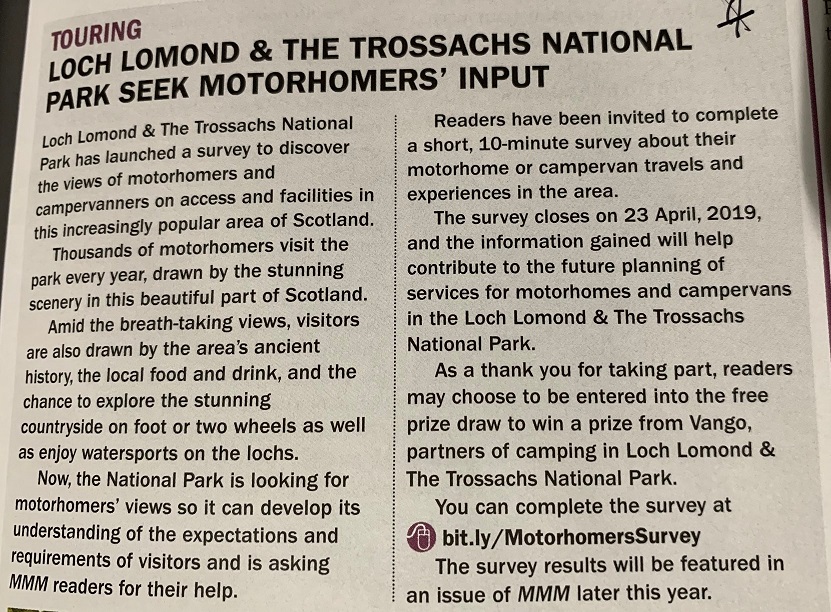
[NB the part of this post which dealt with how the camping byelaws affect campervannsers has been corrected today. The reasons for this are explained here]
The Loch Lomond and Trossachs National Park Authority is keeping pretty quiet about its consultation with campervanners and motorhomers. The “consultation” (see here) has not been advertised on the LLTNPA website (see here) and appears to have been advertised only in selected publications.
It is linked to the LLTNPA’s new 5 year Camping Development Framework 2019-23 (see here) which was considered by the Board ten days ago. That framework covers both tents and motorhomes and replaces the previous Camping Development Strategy. It identified a need for research on motorhomes:
“The increasing use of motorhomes is a trend that requires more detailed work. This will include research to understand the needs and journeys of motorhome users visiting the National Park; identifying gaps in services including overnight motorhome spaces and waste disposal facilities; advice and support for those looking to create motorhome accommodation or services.”
AND
“We will look to build our knowledge around the use of motorhomes, focussing on understanding the requirements of this growing user group to establish how their needs can be met sustainably.”
Most public bodies consult BEFORE developing their strategies, not after they have been agreed but at least the LLTNPA are now starting to engage with campervanners, three years after people pointed out the underprovision for campervans in the National Park.
The survey
The first question asks what type of campervan you own – if you don’t own a campervan it won’t let you progress. Apparently the LLTNPA is unaware of the huge growth in campervan hire companies and cannot conceive that many people now hire campervans – but maybe they just contracted out the design of the survey! I got past the question by ticking the “other” box and then saying I owned a “hire”!
The survey avoids an important issue for campervanners in the National Park, the question of where you are legally allowed to stay overnight in the four camping management zones. While campervans are legally able to stop off overnight alongside any road, which undermined the Park’s attempt to ban campervans in the same went as tents, the LLTNPA still appears to be taking some enforcement action against campervanners. (The current position is explained in the update post referred to above or here). That introduces a degree of uncertainty into where which campervanners can stop off which is experienced nowhere else in Scotland.
In my view that impacts on the experience and pleasure of stopping off in a campervan and needs to be fixed. The uncertainty about rights to stop off without fear of prosecution is not compensated for by the provision of campervan permit areas without facilities, particularly of the type that have been created along parts of Forest Drive.
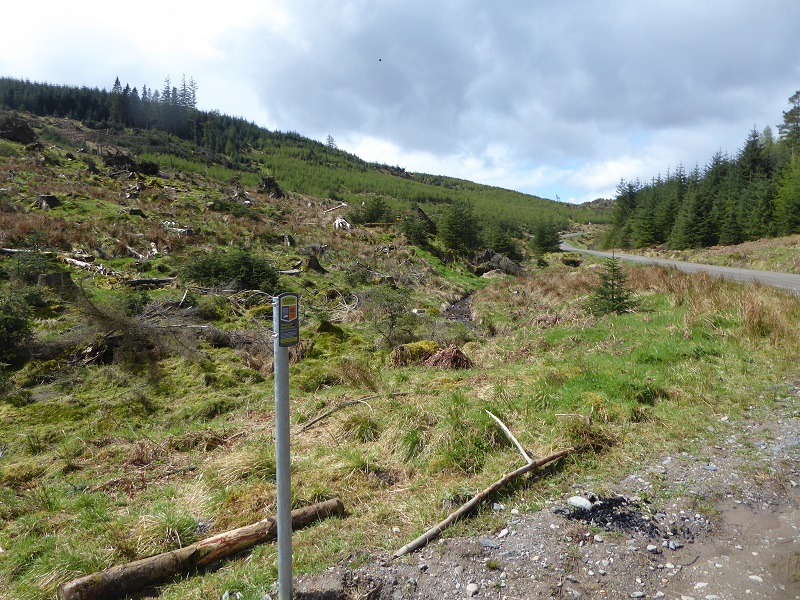
The survey also fails to ask people about their experience of the campervan permit areas. I suspect the reason is that the LLTNPA would not welcome any new data that might conflict with its feedback surveys that report unusually high levels of public satisfaction. Still, anyone with a modicum of understanding about campervanners should be able to work out that some of the permit areas are, like those for camping, not fit for the purpose.
Although the survey avoids asking about these issues, there are places within it where campervanners can comment on them.
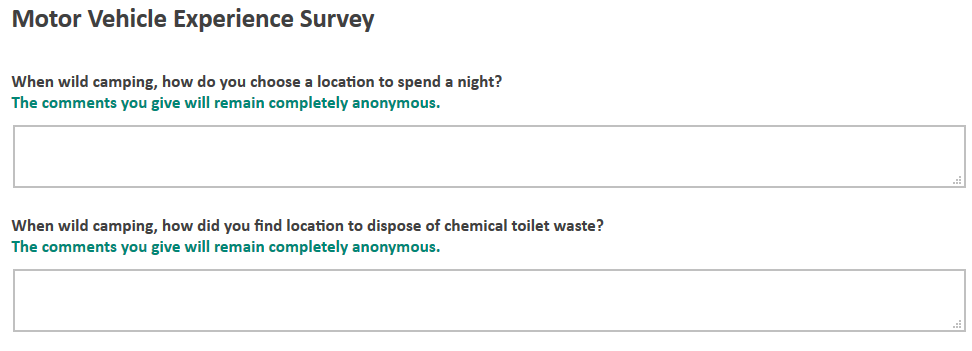
The first question provides an opportunity to explain the difficulties of deciding where to stop off in the LLTNP because of the lack of clarity about where the camping byelaws apply to campervans and to ask for this to be addressed. The second question an opportunity to complain about the lack of public chemical toilet disposal facilities.
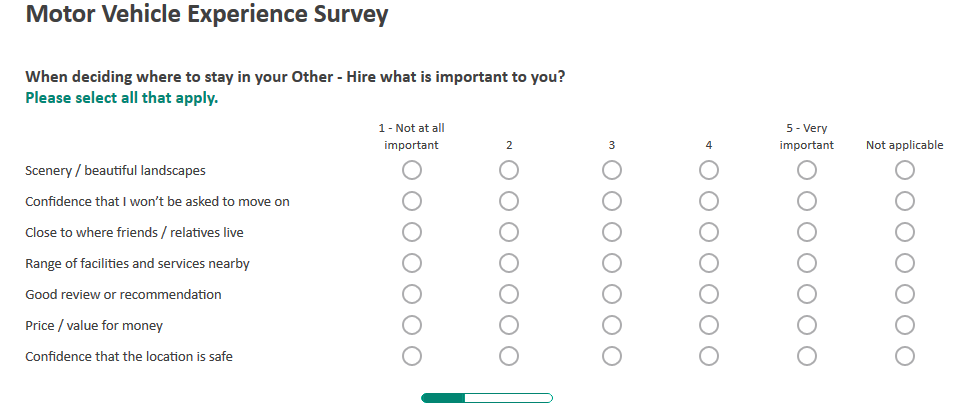
Similarly, if you are concerned about the uncertainty created by the camping byelaws you could rate the second question on “Confidence that I won’t be asked to move on” as being important. The risk, however, is the Park uses the uncertainty as a justification for trying to introduce more permit areas where you have to pay to stop overnight. The sixth question is likely to be used to determine the price of campervan permits in future – so beware!
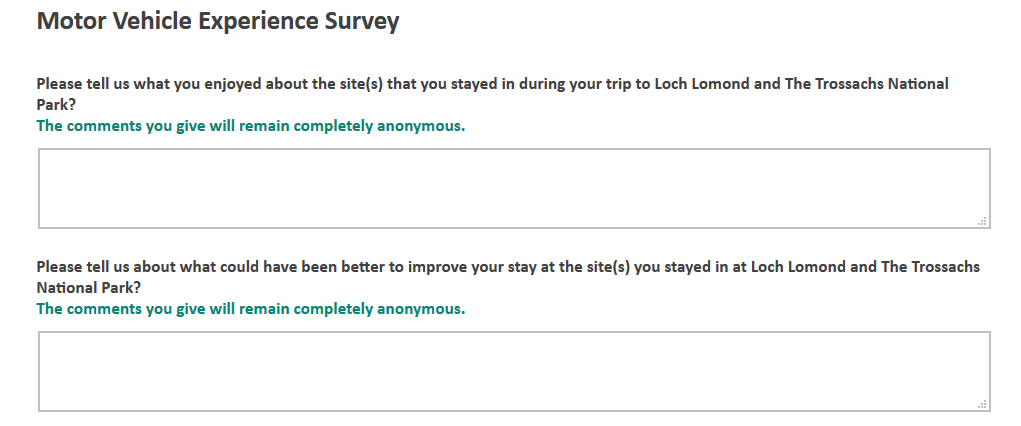
This question provides an opportunity to comment explicitly on campervan permit areas as well as to comment on where new infrastructure might help.
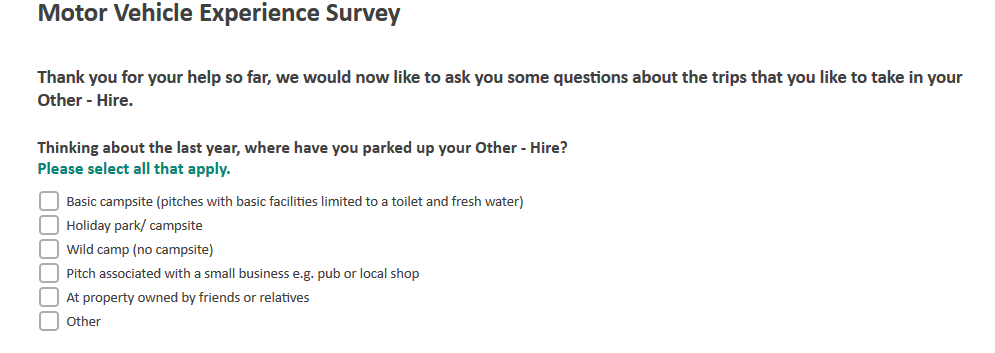
As an aside one interesting thing about the survey is that the LLTNPA, having previously insisted that roadside camping was not “wild camping”, now refers to campervans stopping off by the road as “wild camp”!
What the camping development framework says about campervans
If you are considering completing the survey it is worth being aware of what the Camping Development Framework says about campervans and the proposals contained within it.
“Whilst we recognise that the term camping can be used to cover a range of accommodation including but not exclusive to caravans, hammocks and ‘glamping’ pods, this framework will focus on the two of the most popular forms of overnighting outdoors in the National Park; camping by tent and the use of motorhomes.”
“under the previous Camping Development Strategy we invested in the creation of camping permit areas for tents and motorhomes”
Comment: the only investment for motorhomes consisted of putting up permit area signs and marking spaces on tarmac. There were NO new facilities created for campervans or motorhomes on the French aires model as confirmed by:
“Camping permit areas have no formal facilities but have basic onsite signage to delineate the area. Some of these permit areas may have services available close by. In return for a small administrative fee, a camping permit provides a temporary exemption from the byelaws allowing informal camping for people looking for a wilder experience in popular parts of the National Park.”
Comment: the LLTNPA once again avoid the legal issue which is that campervans have a legal right to stop off overnight alongside a road. Its wrong therefore to describe a permit as providing “a temporary exemption” from the byelaws for campervans unless the Park can show none of the campervan permit areas are on the road network. This, so far, it has failed to do.
Motorhomes and Campervans – The popularity of campervans and motorhomes has significantly increased in recent years. In Europe, where the use of motorhomes and campervans is far more established, they are often well catered for with information available and services such as Aires. These are specific places, such as car parks and farms, which allow motorhomes and campervans to stop overnight, often for free. The picture in the UK is very different, often leading to confusion for motorhome and campervan users about where they can stop and where they will be able to drop off waste and take on water. Some campsites cater for motorhomes and campervans but not all offer the option of allowing the disposal of waste for those who aren’t staying in the campsite overnight. The National Park Authority provides some bookable ‘wild’ motorhome and campervan permit spaces in the Trossachs and on the west side of Loch Lomond along arterial roads in suitable off-road locations for short stays of up to three nights, similar to the camping permit areas for tents.
Comment: the biggest confusion about where campervans can stop off overnight in Scotland has been created by the LLTNPA trying to apply the byelaws to campervans when there is a legal right to stop off overnight on the road network! The LLTNPA hints at the law here by saying its campervan permit areas are in “suitable off-road” locations while ignoring the fact that its permit areas are all on private roads. The legal question is whether there is right of passage along these roads. Where this is the case, as at Inveruglas, it would be unlawful for the LLTNPA to try and use the byelaws to enforce the permit system.
Unlike with tents, where the LLTNPA has dropped any concrete plans for new places or campsites the Framework does set targets for new campervan spaces and sets out aspirations for waste disposal points.
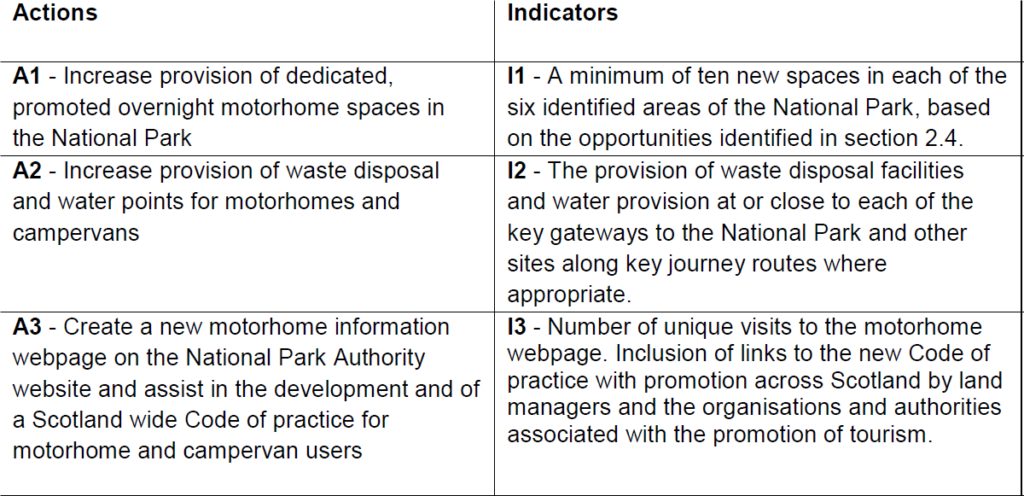
The proposal for waste disposal points is very welcome and that 60 new places for campervans could be a positive step forward as long as these were on the model of continental aires, where basic facilities are provided. Any new spaces should not be about introducing charges for places where legally campervans can at present stop off for free – though as other papers at the Board Meeting made clear this is likely to be driving the Park’s agenda. Campervan permit areas potentially offer a good source of income for very little investment.
What needs to happen?
I hope the LLTNPA will broadcast this survey more widely, that campervanners will respond and that the LLTNPA will publish the results. The LLTNPA should then consider these at a Board Meeting later on this year with a view to developing more meaningful engagement with the campervanning community and a more fully developed plan. That plan should focus on the development of appropriate infrastructure for campervans, co-designed with campervanners.

https://www.snapsurveys.com/wh/s.asp?k=154955502381
A direct link
Thanks Ian, should have put direct link into post and now done so, Nick
Have the Caravan and Motorhome Club and the Camping and Caravanning Club been alerted to this?
Niall, I hope people will share the consultation as widely as possible. I have not alerted anyone and would appreciate it if other people could circulate, Nick
I came across the survey through Campervan Magazine and MMM (Motorhome Monthly Mag). They have publicised them on social media and in the print magazine. These are fairly widely read by motorhomers and campervan owners but perhaps not as wide as the club magazines – although these readers will include people with caravans and tents.
Flips sake how much money do these people want to spend on the obvious toilets water waste disposal and peace and freedom no wardens .